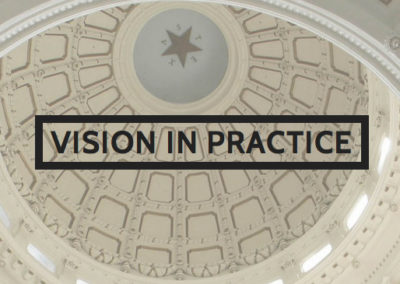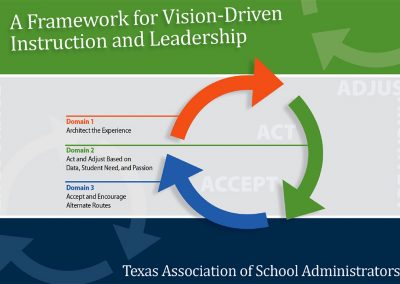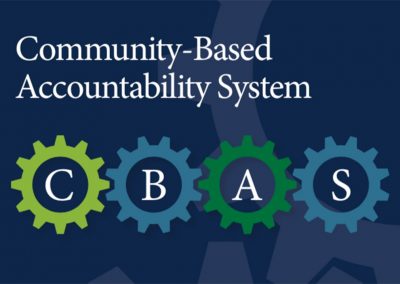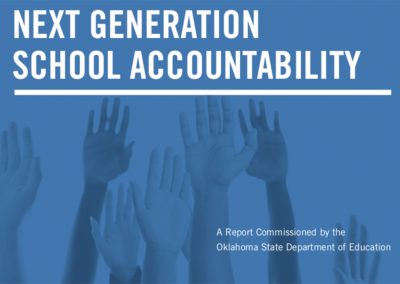To prepare future-ready students, schools must inspire them and stimulate their learning. But the current system by which Texas public schools are held accountable for student learning — with its focus on high-stakes standardized testing — has created an environment in which the curriculum has been narrowed and only academic abilities are valued, with creativity, problem-solving and teamwork stifled.
Community-based accountability empowers students, parents, and educators to build a learning community that honors and supports their work. It empowers school districts to design their own internal systems of assessment and accountability that, while meeting general state standards, allow them to innovate and customize curriculum and instruction to meet the needs and interests of their communities.
What is community-based accountability?
Community-based accountability is not a way to escape standardized testing or a tool to pass judgment on individual students. It is a:
- locally developed system of evidence of student learning
- strategic and customized form of measuring student achievement
- rigorous descriptive reporting to parents and community members
What's included in a community-based accountability system?
The foundation of CBAS is a four-part system consisting of:
- student and classroom-centered evidence of learning
- strategic use of standardized testing
- performance reviews and validation of learning by highly trained visiting teams
- rigorous descriptive reporting to parents and communities
The Vision: Community-Based Accountability
Article IV: Accountability for Learning
Supporting Premises
- Accountability systems should be carefully designed on a theoretical base that honors what teachers and students actually do, that empowers and builds integrity, trust, and commitment to the values that define the school.
- Assessment results and other examples of work products and performances of students should be used as the primary information source for understanding where students are and what they need. These can also be used for reporting to parents and the public.
- Accountability systems that draw on assessment information external to the class, school, or district are important for internal confidence in large systems and external confidence in all districts. Descriptions of the contexts in which assessments are given should be a part of reports. All parties should have some say in what measures are used and the weights assigned to different measures.
- Districts should be allowed to design their own internal systems of assessment for learning and accountability, as long as they meet certain specified state standards.
- Those for whom the accountability mechanisms are to apply must have confidence and trust that they are fair and unbiased.
- Sampling techniques (the full range of examinations, evaluation of student work products, and performances as well as teacher tests and standardized tests) should be used in lieu of testing every child every year.
- Processes should be clearly defined so they can be controlled, measured, and improved.
- End results are not the only results that matter, for some results are set as goals that, if achieved first, would enhance the end result.
- An effective accountability system has multiple measures in place that provide for continuing employment, promotion, development, probation or termination; and respects the perspective that most people want to do a good job and want others to do a good job, as well.
- Standardized tests (including criterion-referenced tests) cannot measure with precision profound learning.
- Much for which schools need to be accountable will require subjective measures, and the decision about what and how to measure is admittedly one of the most subjective.
- Accountability systems are guided by the fact that to attach any matter highly valued by students, teachers, school leaders, or schools/districts to any single measure such as a standardized test, corrupts the test and the integrity of what it measures as well as the accountability it was intended to provide.
- Labels for schools and particularly those that use the lowest performing unit as the basis for a punitive label should be avoided. There is a distinction between identifying performance gaps and labeling. Identification of performance gaps enables schools to move forward in designing different instructional strategies or approaches to help students achieve the learning desired.
- Complete transparency is a requisite for how all data is collected, analyzed, and reported, including the subjective, sometimes political, manner in which state proficiency standards are set on state tests, if such tests are to be used.
- A multi-year cycle for periodic district and campus performance reviews should be established, using highly trained visiting teams to analyze a predetermined set of student performance information.
- As single measurements, standardized norm-referenced tests, criterion-referenced state tests, aptitude tests, end-of-course exams, other oral and written examinations, student performances/projects/portfolios, regular teacher assessments, and grades each give a piece of the picture; and used in combination, can provide a more holistic view. However, if a high-stakes standardized test is given a preponderance of weight, it will become the assessment that really counts, others notwithstanding.
- Standardized tests to which high stakes are attached can become substitutes for the learning standards themselves and result in “teaching to the test” rather than teaching for attainment of the standard.
- Consequences (sanctions) should be associated with a performance assessment only if the assessment uses a combination of measures including sample examinations and other student performances to ascertain the degree to which the learning level is outside the variance allowed.
- Alternative assessments in combinations as indicated in other premises in this section should be considered.
Alamo Heights ISD
In August 2019, Alamo Heights ISD, a member of the Texas Public Accountability Consortium (TPAC), published its first report resulting from the district’s community-based accountability system. During the preceding two years, with input of school staff, leaders, students, and community members, the district designed a comprehensive local CBAS that relies on multiple data sources, authentic assessment opportunities, observations, and feedback from stakeholders to provide evidence of progress toward the educational outcomes that the community determined are in the best interest of their children.
Clear Creek ISD
Clear Creek ISD has been leading the way in advocating for and on behalf of communities across Texas to create their own local reporting systems. Since polling its community and finding collective agreement, CCISD now issues its annual Community-Based Accountability Report to provide the community with a true reflection of how the school district is doing in the areas that are most important to the community: what happens every day, in every school; the amount of human and financial resources invested in providing students varied opportunities; and the level of public trust and community involvement.
College Station ISD
How is student success measured in College Station ISD? Not solely with STAAR scores. The district’s community-based accountability system is based on its ability to: recruit, develop, and retain qualified and dedicated staff; provide a challenging, relevant, engaging, and aligned curriculum; provide an array of services, programs, and opportunities to meet the needs of students; create classroom and campus cultures that involve families; and commit to responsible use of taxpayer dollars.
Frisco ISD
Starting in 2020, Frisco ISD will publish a community-based accountability report in the fall of each school year in conjunction with the release of the state accountability ratings. The district, a member of the Texas Public Accountability Consortium (TPAC), has been working with community members to identify a diverse set of meaningful data points regarding what success means within the community.
Northwest ISD
During the 2012-13 school year, a committee of Northwest ISD students, parents, community members, staff, and administrators identified community values and proposed measures of success in the school district. They included student achievement in areas including SAT/ACT scores, internships, college scholarships, dual-credit courses, volunteer and community outreach, community partnerships, and more. In 2017, a committee of NISD stakeholders that included students, parents, community members, teachers, and administrators assembled multiple times to review the district’s Profile of Graduate and the ways it measures progress towards that goal.
Royse City ISD
In fall 2017, members of the Royse City Community Advisory Committee made it their mission to discover what matters most to their community related to education. Nineteen areas of interest rose to the top. Now, each year, the district publishes its Community Scorecard to report on 19 indicators of performance and progress that go well beyond standardized test scores to include: teaching and learning, opportunities for students, culture and climate, and facilities and support operations.
Sunnyvale ISD
Since 2015, Sunnyvale ISD has presented parents and other members of its community with an annual report that provides information related to student performance that extends beyond standardized test scores. The district has designed its own rating system that “honors the whole Sunnyvale child” by evaluating the district’s performance at a higher standard than those required by the state and by including items of importance to the community. The Sunnyvale ISD rating system was created with the intent of accurately reporting to the community what students are achieving regularly – from academic progress and future-readiness, to their extracurricular endeavors, and even parental and community involvement.
Developing a New System
The Texas Public Accountability Consortium (TPAC) is a group of Texas school districts working to build on the success of community-based accountability systems already in use in districts across the state by developing next-generation measures and assessments that would enable wider use of such systems.









